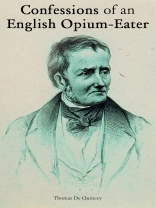Confessions of an English Opium-Eater is an autobiographical account written by Thomas De Quincey, about his laudanum addiction and its effect on his life. De Quincey’s account was organized into two parts. Part I contains Preliminary Confessions, and it is devoted to the author’s childhood and youth, and concentrated upon the emotional and psychological factors that underlay the later opium experiences – especially the period in his late teens that De Quincey spent as a homeless runaway in Oxford Street in London in 1802 and 1803. Part II is split into several sections, the main two being The Pleasures of Opium and The Pains of Opium. The Pleasures of Opium discusses the early and largely positive phase of the author’s experience with the drug, from 1804 until 1812. The Pains of Opium recounts the extreme of the author’s opium experience (up to that time), with insomnia, nightmares, frightening visions, and difficult physical symptoms.
عن المؤلف
Thomas De Quincey (1785-1859) was an English writer, essayist, and literary critic, best known for his Confessions of an English Opium-Eater (1821). Many scholars suggest that in publishing this work De Quincey inaugurated the tradition of addiction literature in the West. His immediate influence extended to Edgar Allan Poe, Fitz Hugh Ludlow, Charles Baudelaire and Nikolai Gogol, but even major 20th-century writers such as Jorge Luis Borges admired and claimed to be partly influenced by his work.












